#that it redeems Hinduism as such
Explore tagged Tumblr posts
Text
Kalki 2898AD Release Trailer - Bhairava Character Analysis!
There are many theories circulating about Bhairava's character and its importance in the movie. Here's my two cents regarding this. And to be honest, it isn't entirely my views too. It's what we came up when discussing in the Varadeva Discord Server.
First of all, there's a huge chance that Deepika's baby is red herring and Bhairava is the real Kalki. Ashwathama will realise this at the end of the movie and change his stance.



But my favourite theory is Bhairava being Lord Shiva. When Bhairava called himself the 'living legend in Kashi' in the Bujji & Bhairava series, it kind of stuck with me. Who's more legendary than Lord Shiva in Kashi? And the story goes that Shiva gave Kalki the divine weapon, the all-knowing talking parrot and the white horse. Bhairava have all the three; we saw the weapon in the first promo and Bujji's brain and body are the talking parrot and white horse equivalent. if Bhairava is Shiva, he's actually protecting the baby while pretending to hunt him for the Complex as well as testing Ashwathama's determination for redemption. In Mahabharata, Ashwathama was born after Dronacharya performed several years of severe penance to please Shiva as he wanted a son who possessed the strength and bravery of Shiva. So, it would make sense that Shiva aids him in his journey of redemption.
What if Bhairava is neither Kalki nor Shiva? Then what is his character doing in the movie?

"Despite the endless opportunities spanning over the generations, man fails to redeem himself and he never will."
I think this quote by Kamal Haasan's character, Kali is the key to Bhairava's significance in the movie, if he is not the titular character 'Kalki'.
There are many worlds in Hinduism, but our Puranas predominantly talk about the Swarga (abode of Devas), Prithvi (abode of humans) and Patal (abode of demons). There are also three worlds in the film: Complex, Shambala and Kashi. Unlike Puranas, where there were three races inhabiting the three worlds, in the film, the three worlds are inhabited by the humans only.

The Complex is the place where God is banned. They treat Supreme Yaskin as the God. They have conquered the world and taken all the resources for themselves. In appearance, the Complex gives the illusion of Swarga, but it actually embodies the demonic qualities of Patal.
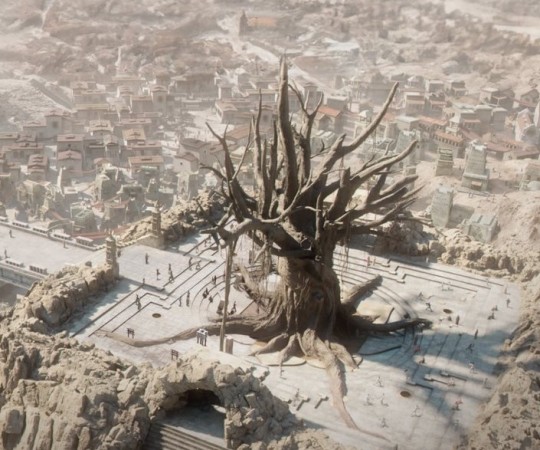
Shambala is the place where they still believe in God and hope for his return to save them. They fight the Complex and their unjust actions. They are safe haven for anyone who wants to escape the hold of the Complex. In appearance, they are an underground society (Patal), but they are actually the forces of righteousness in the desolate world, fighting on the side of God and thus symbolises Devas of Swarga.

Then there is Kashi, the last surviving city. They are neutral. They are neither the evil conqueror nor the righteous warriors. They are humans who are trying to survive in an unfair world. They are not on anyone's side, but their own side. They represent the humans of Prithvi.
"In this world, there's only one side to be on. Your own side."
Bhairava and the bounty hunters of Kashi are the representation of the man in Kali's quote. They embody the qualities of selfishness, greed, and going to any extent to accomplish their goals, without caring about the consequences of their actions.
To be fair, Bhairava isn't doing anything wrong. He's trying to survive in a world which has lost all hopes. But he's so caught up in this mode of survival that he can't recognise this new hope for a better tomorrow, that Ashwathama and the people of Shambala are seeing in Sumati and her baby. All he sees the 5-star bounty that is his one shot at entering the Complex. He's not realising that he's fighting for the wrong side, that he's fighting to keep the old hierarchies intact that had made this world a hopeless place for him and others like him in the first place. He's helping the people who are the cause of all his problems under the illusion of becoming one of them.

Bhairava represents the man who is given numerous chances by the God, but he's so trapped in the Maya (worldly illusion) that he fails to recognise him and hence, is forever doomed to be trapped in the cycle of suffering.
Will Bhairava recognise the truth before it's too late? Or he will handover Sumati over to the Complex?
Bhairava's action would decide if the world is worth saving or not. If God should keep his promise and take birth to save all the humans? Or he should just let the humans rot in the hell, they have turned the Earth into.
The movie is not just about Ashwathama's redemption, but also the redemption of the mankind, represented by Bhairava.
As Kali said, humans have given numerous opportunities by the God to redeem themselves, but they have failed each time. Like Duryodhana failed when he refused to give even five villages to Pandavas, when Krishna asked, leading to his defeat in the Mahabharata war. Maybe that's why Ashwathama is having flashbacks of Mahabharata when fighting with Bhairava. He is seeing his past self in him. When he went against the Lord himself, blinded by his ambition and loyalty for Duryodhana.


Humanity is given another chance. Kali is sure we will fail this time too. It's up to Bhairava now, if humans fail again or they finally succeed in redeeming themselves this time.
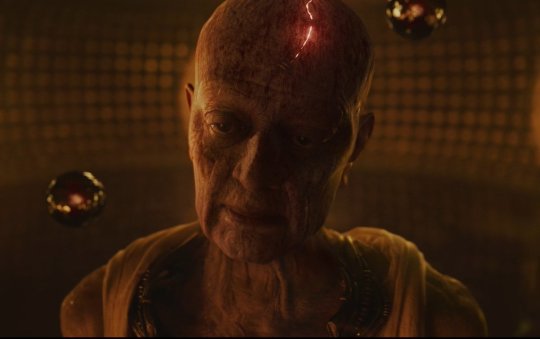
#kalki2898ad#prabhas#deepika padukone#amitabh bachchan#kamal haasan#nag ashwin#bujji#bhairava#desiblr#desi tumblr#indian cinema#telugu movies
96 notes
·
View notes
Text
Spiritual Thoughts and Other Tingzz 🥰🥺✨
The Paradox of Being
2. Twin flames, soulmates and karmic partners in astrology
3. Sufi Love through Bollywood music
4. About Feminine Intuition
5. Spiritual Stagnation & Desire
6. Manifestation & Astrology
7. Mantra Purusha
8. EVIL EYE REMEDIES
9.Dangers of Improper Mantra Chanting
10. Glamour Magic?
11. Glamour Magic rituals from anon
12. Insecure people
13. Mantra tips
14. my strength
15. My journey with Goddess worship
16.Can I worship more than one God?
17. Mantras for protection
18. Astrology as a practical tool
19.Exposing Freud pt 1
20. Freud tea
21. Therapy is enabling?
22. Claire's aura changes
23. Hinduism and Goddess Worship in India
24. My experience with Ashwagandha
25. My exp with ash pt 2
YIN SPIRITUALITY:
Yin centric exercises & Somatics
Yab-yum Tantric pose
How to be sensual
DESI POSTS HEHE:
Songs for my pasandida marad
Desi meme
Sonakshi Sinha gossip
Qubool Hai supremacy
MOODBOARDS
Serendipity
Troublesome Lovesome
Shuddh Desi Romance
Angel out of Heaven
Love you to the Moon
Old School Love
Give Me Love
Etherealwave Lover
Lover, come over
You're My Tranquil Shadow
My Seven
In the mood for loving
I love you, my darkness
Sonora Senpai
Bedroom Whispers
My blue little lily blue
A little bit of ever after
We're lost angels, there's no redeeming us
Eternity of Us
The Galaxy of Love
A Heavenly Way To...
#vedic astro notes#astrology observations#sidereal astrology#astrology notes#nakshatras#astrology#astro notes#vedic astrology#astro observations#astroblr#jyotish#jupiter#saturn#venus#uttara bhadrapada
156 notes
·
View notes
Text
Bruno Buccellati - Monster AU Profile
(hopefully screen-reader-friendly edition with detailed image descriptions)
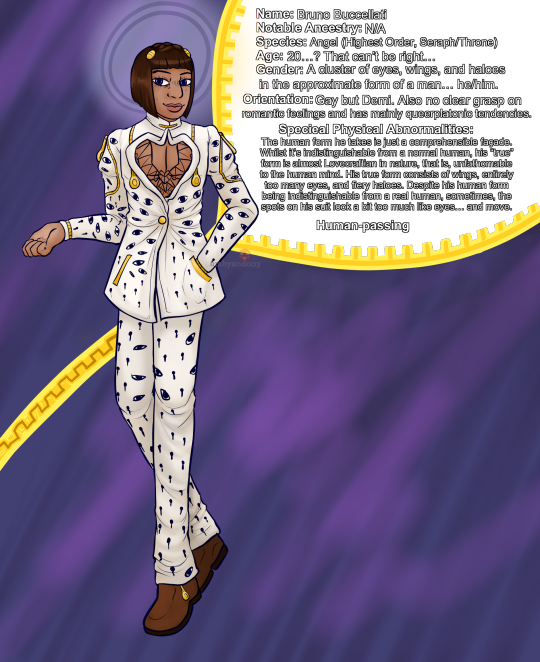
Bruno Buccellati, something much greater than a human, with more power than you could imagine.
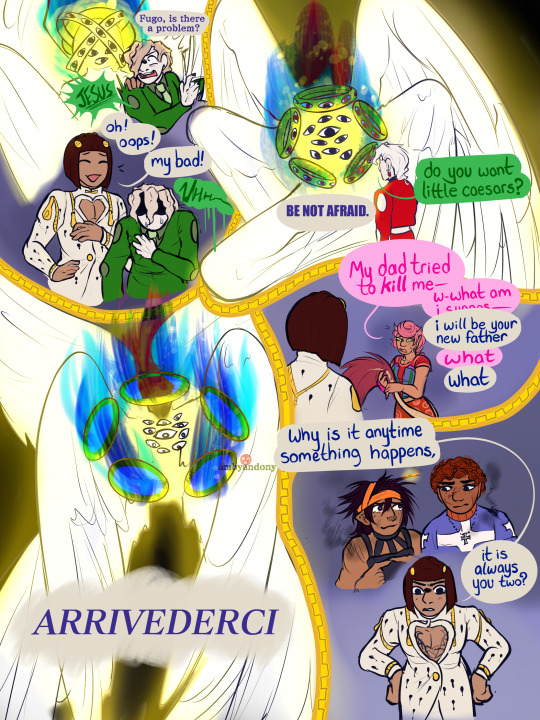
Preface about species type:
In this AU, Bruno is an angel—a Catholic-aligned, Biblical angel to be specific—of the highest order, having inspirations and traits from depictions of both Seraphim and Thrones. The intricacies of Religion in the Monster AU are hard to get into, but as a general idea, understand that most major theistic religions (Judaism, Islam, Christianity, Hinduism, Shinto, as well as many native religions and other theology e.g. Greek, Norse, Finnish) all 'coexist' to an extent, in terms of actual mythological legitimacy. I'm not going to get into all of it, just know that Buccellati being a Catholic-aligned angel doesn't mean there aren't also, say, Jewish-aligned angels. It's complicated. Being a thematic combination of a Seraph and Throne, Bruno's true form is largely incomprehensible to the average human, and he has incredible, yet limited, divine power. He's "from" "Heaven", but unlike what one might expect, he's not much limited by a 'divine law'; he has no strict morals that he must adhere to, and perhaps he doesn't necessarily have a directive on Earth. The circumstances for his existence as he is here are a little complicated, but, simply put; in a sense, he's just here to keep an eye... or several... on things.
Details related to Angelicism:
Forgive me but— he's basically the Aziraphale to Abbacchio's Crowley.
Trying to 'save' or 'redeem' him. He knows there's still good left in him. The, uh, getting him to join the mafia thing is... questionable, but we're not gonna get into all that.
Both Buccellati and Abbacchio recognised what each other was the moment they set eyes on each other. Their energies and auras were clear and visible to each other. Abbacchio naturally turned to retreat initially, but Buccellati recognised the good he saw remaining in Abbacchio and instead of letting him leave, offered redemption. And maybe some part of Abbacchio knew there was good left in him, because he accepted.
He uses his human form most of the time as it doesn't make much sense for him to use his true form when most can't properly comprehend it and it would really just freak people out.
He also has a '''true voice''' to go with the true form. It can't really be effectively described as it's, like his true form, fairly hard to comprehend, but if words had to be put to give a general idea; imagine a voice that is actually a collection of several different simultaneous voices, heavily distorted, completely understandable communicatively despite being so hard to process.
When enraged or when he generally just loses his cool, sometimes the true form will slip through, which often occurs with both visual and vocal distortion, but may also only appear as vocal distortion.
The true voice and form are both pretty terrifying no matter who's experiencing it, especially as he's a high-order angel, thus incredibly powerful.
Sometimes uses a bit of the True Voice intentionally to intimidate people. Most people around who have caught snippets of it generally end up writing it off as "that's just Bruno being Bruno", which, to be fair, it is,
He has an... Aura. I'm not talking about the Stand Aura; he at times appears to have a sort of golden glow around him, particularly around or behind his head. You can actually see it, at least, and the longer you look, the clearer it gets, it's just hard to pinpoint what exactly you're looking at.
If you catch sight of him just out of the corner of your eye, his true form will be perceived instead. But because it's hard to comprehend, it essentially means he can't really be seen at the edge of someone's peripheral (unless the person in question happens to have some kind of special eyesight) and it ends up looking a bit like catching a movement or shadow out of the corner of your eye.
He's an angel, yes, a divine being, not a human. However... he still had his parents. How does that work? Well, sometimes circumstances like this can occur. Sometimes, a baby may fall deathly ill. The parents, helpless to improve the situation by their own abilities, turn to praying for a miracle. The baby isn't given much time left to live, then suddenly, miraculously, recovers, as if they had never been ill in the first place. The child's soul may have been substituted with an angel as the original soul had to move on. The child will be raised as a human, and will watch over their human parents once they have the cognisance to recognise their own true nature; somewhat reminiscent of a less-sinister changeling. This may be the case with Bruno.
Perhaps one of the many reasons he is so opposed to drugs in the way that he is; he was sent to trade places with a human and to protect the human that would raise him, but his human father's death was ultimately caused by drug dealers, and Bruno was thereby unable to protect him in that situation, interfering with his purpose for being on Earth.
Again, yes, he's an angel. But this doesn't mean he must be perfectly virtuous and nonviolent. He unsurprisingly frequently uses violence as a means to an end. While violence isn't typically his first answer to most problems, he will never hesitate when he feels that it IS the answer.
Details about Buccellati:
Generous and welcoming to those in need. Very nurturing and protective by personality. You Do Not Mess With His Men.
Particularly protective of his human men. Humans are so... fragile. Plus, Fugo joined him first, that's his firstborn-
Loves to play up the whole 'angel' thing when he gets the chance. Likes to use the sort of "Old English" equivalent of Italian (so, Latin, I suppose). 'Be not afraid, child...' ...Fugo gets on his case for grammatical errors frequently.
Has an instinct to know when his children men have broken something (generally an object). This generally allows him to show up near-immediately after something's been broken to lecture whoever broke it about being more careful. In some extreme circumstances, it can be used to call on him for backup—preferably, just try not to have the thing you're breaking be your bones.
Being a literal divine being doesn't save him from being a Suburban Parent stereotype. Stupidest dad jokes you've ever heard that are so unfunny that they're ironically funny, and the irony eventually gets lost and they're just ... funny. Live laugh love! Man I Love Fishing! Turn that frown upside down—
It's really hard to sneak things by him. Even when he turns his back, he seems to know if you're doing something you shouldn't be. He jokes that he has eyes in the back of his head... but is he really joking?
Very kind when he can afford to be. Civilians love him! He always finds it so funny when people are like "Thank God you're here!!" or "You're a godsend/blessing!" because he's like... 😏 that's right
Hates drugs! Winners don't do drugs! This hasn't changed.
Oh dear! It appears that this daughter, which is not mine, is a demon! I can fix one of those problems by becoming her new father.
Yes there's Bruabba but it's really more queerplatonic than anything as Buccellati doesn't feel a full grasp of romantic 'love' and Abbacchio isn't ready for romantic love after suffering the kinds of loss he's suffered, so their relationship is blatantly not-platonic but doesn't reach fully into 'romantic'.
He's trying so so hard to control these kids but every day it's just another thing where Fugo's having a mental breakdown and Narancia's eating the asbestos in the wall insulation and Mista is getting way too close to Abbacchio with that silver cross necklace WHO LEFT THE OVEN ON
#golden wind#il vento d'oro#vento aureo#jjba#jjba fanart#jjba vento aureo#monster au#jojo fanart#jojos bizarre adventure#jojo no kimyou na bouken#jojo's bizarre adventure#jjba golden wind#jjba monster au#jojo au#jjba au#bruabba#monster au profile#amby draws#my art#Bruno Buccellati#Bruno Bucciarati#Leone Abbacchio#Narancia#Narancia Ghirga#Guido Mista#Pannacotta Fugo#Fugo Pannacotta#Trish Una#accessibility
47 notes
·
View notes
Text
i wish i had the type of blind faith where i had a sense of comfort based on who i aligned myself with by religion, where i genuinely, despite ignorantly, believed i was going to heaven because of which team i was born into or later in life accepted into, whatever... but focusing on anything constructed by humans relating to monotheism or polytheism is a trigger for my mental illness, and my stable and more controlled thought process drifts toward the ideology of human written word with such influence and power to be a corrupt control system to the masses looking for hope or born into it, molding us to have a set of strict and unreasonable morals at times, as well as rules that go against the nature of our species, as a control of behavior tactic to fit in society and obey.
i mean, yeah... we are malleable and capable of being conditioned depending on who is doing the molding.
even though perhaps something out there is watching you or even more concerning, talking to you in your head, i am heavily influenced by my own past mistakes of declaring delusion as truth to believe it ain't the lord.
i think it is more insane to believe in god rather than the existence of intelligent life that can manipulate the laws of physics and your entire reality without you being aware of it at first, even though it is not at all socially acceptable to believe this and me believing in this topic can be seen as a delusion in itself. sure, okay. i will always believe in my experiences based on the weird shit that has been happening in my life since my first memory.
it hasn't been since very recent times that actual relief from mental illness was implemented and put in practice, with holistic as well as more traditional forms of therapy, support and medication management
i did not have a life with a severe mental illness until I was 21, almost 22. i had pretty bad depression two times before my acute state of psychosis, first when home life became emotionally tough for my younger brother and i when i was 12 and also after a breakup when i was 18.
moving on to provide more info in relation to having you view me as less or in a negative light... i know and am aware there is a variety of power of intelligence that exists out there in the universe, which is beyond human comprehension and can be mistaken as the form of god. there are capable minds there. advanced science and the evolution of a species exceeds us by that of infinite extent or possibility.
i truly mean no offense to anyone who is religious and holds a true connection to it, what i am writing is not meant to disregard you or insult your beliefs, i am just sharing my own thoughts and perhaps frustrations at times, whether or not i am to be believed or have mutual agreement on the subject.
at a low point while seeking safety and saving by genuine saviority, i filled most of a smaller handheld notebook as an expression of letters i had written to god begging for mercy, relief, and to be redeemed. i still have it. i used to read it and cry a lot at the time in the past but for me, keeping a distance from all and everything related to religion has done a lot of help for me, atleast more than struggling to have consistent belief in my written prayer while fighting in the back of my mind that these are not my core beliefs. i was in desperation. i even read it to a priest once as he prayed for me, but i just ended up feeling like i was getting attacked by something after lol.
you wanna know what saved me?
a change in my medication and taking my time to heal at a peaceful crisis bed away from my current place of home. during this time, i was exploring hellenic paganism as well as esoteric buddhism and hinduism. i find these to fit me more in regard to what i have felt inclined to believe in the past before being influenced by any of the texts i had been exploring.
i enjoy the subject matter and the feeling all of those subjects provide me with over the coldness of christianity or catholicism, which is the only exposure i have had familally but keep in mind, i was hardly exposed at all except saying spoken prayer at dinner.
i think mental illness has major influence on how cults form and religious fanaticsm, being that the general idea this shit cultivated from a certain time period where there was a lack of solutions or help for mental health. religious war has always been a problem since the dawn of society.
there is also the charm of earth being perfectly located in our planetary system in conjunction with the sun that has stemmed evolution and the creation of sprouted life that is often seen as miracle by the hand of god. it does form a curiosity inside me, but we as humans are infantile in relation to the universe in the state of our advancement, despite learning about all the cool shit i come acrosss daily due to other's research, hypothesis, and discovery.
to me, organized religion on a broader scale has always been about power and fear mongering. i am not denying there are lovely people who believe in god, but then again, i am a fan of kindness and acceptance in general. and i do appreciate the sense of unity and love that can be a possible outcome of faith if that community has given you positive experiences. everything is subjective based on experience and self-reflection.
honesty, i accept anyone who has or is actively trying to better themselves, where it does not negatively affect those that surround them. and even though i state myself as atheist, there is a huge part of me that believes in the human spirit and will. i also believe in karma.
personally, i believe our species has been discreetly influenced by what is watching and observing us, something that has always been aware of our planet since the dawn of the first detectable species on earth.
the possibility of absolutely any bizarre thought has the ability to manifest, and anything you can think of that can happen is always a possibility. i am a firm believer in that. i also have the belief that those who are advanced by an unthinkable extent in comparison to us have perfected their species by the form of science and experimentation.
i do think eastern influence is a positive thing with certain practices, such as with chanting mantra (because of the practice of creating a certain vibration) as soothing and helpful, as well as yoga, whether implementing aromatherapeutic scents to imprint a relaxing moment that can be triggered by the olfactory nerve to hit a nice sense of nostalgia and bring a sense of peace or comfort, ways to balance and activate your chakras etc. i also believe in sage clearing energy in spaces and try to consider my intent when i make decisions or create thoughts that ot recognize as my own. all dat, but i feel it can all be explained by the use of understanding our biology as well as how we are affected mentally. basically, by what is foundated on the different forms of science we depend on to try and understand problems to solve by creating solutions toward.
what i am getting at mostly is that i believe we are observed as a species by intelligent designers who are sentient (or even evolved beyond sentience... think of interdimensional) who use earth and it's inhabitants as expiremental value and to harvest from our reproductive systems for their own creation of life constructed in a lab by base or ship, if anything. i also believe that we are used as batteries as an energy source by sinster form that can attach itself to us.
tldr; watch out, y'all talking to god and get a fucking response, that shit is on the bipolar and schizophrenia spectrum. you are engaging with something that is unknown and capable of manipulating your thoughts and emotions, but i cannot and will not ever attempt to try and pursuade you toward my beliefs. i refuse to try and debate or convince anyone on it, because you are set with your own as i am.
i'm going to bed. if there are any spelling mistakes or grammar issues, idgaf right now. my autocorrect suggests awful typos, and the way it's been suggesting edits recently has been concerning lmao.
anyway, good night!
4 notes
·
View notes
Text
They will say Ram is a national symbol, a symbol of Hindu pride. But did you consent to being converted to something as banal and nasty as the symbol of an ethnic nationalism? You redeemed your devotees, those you wronged, but your opponents as well. But this temple is a monument to exclusion, a brute majoritarianism subordinating others. Look at the men, both political and spiritual, who speak in your name, and the blood, power and intimidation they have on their hands. Your name will be used to shore up the coarsest forms of personalised power; the entire liturgy is a display of the most corrupt of monarchical power, in a democratic garb. I understand that so many of my fellow Hindus will experience this as a great catharsis, as the weight of history being lifted. But deep down we need to ask: How did we become so insecure that we need a cowardly victory of razing down a monument to satiate out collective narcissism? And is this a kind of insecurity that is never satiated, it expands its circle until it colonises all sentiment? This temple is the first real colonisation of Hinduism by political power. I feel chained like never before.
#go ahead read it#stop pretending that this is separate from politics#and its just about your religion#you cannot keep going fuck modi and not acknowledge anything he or his sangh parivar does#praying for the muslims who will harassed on the streets on 22nd and will be forced to say jai shree ram by hindu mobs#mobs which will gather around mosques to intimidate and threaten
4 notes
·
View notes
Text
Shraddha TV Satsang 07-05-2024 || Episode: 2554 || Sant Rampal Ji Mahara...
#GodMorningTuesday #TuesdayMotivation #TuesdayThoughts
#अविनाशी_परमात्मा_कबीर
Sant Rampal Ji Maharaj
#जगत_उद्धारक_संत_रामपालजी
#TatvadarshiSant
#TrueGuru
#SantRampalJiMaharaj
#FactfulDebates
Sant Rampal Ji Maharaj
YouTube Channel
#ऐसे_सुख_देता_है_भगवान
👑Kabir Is God👑
#KabirIsGod
#SaintRampalJi #SaviourOfTheWorld
#SocialReformer
#trending #fbreels #saviour #equality #spiritualjourney #SatlokAshram #redeemer #liberty #inspiration #lifequotes #freedomfighter #Satlok
#india #world #Faridabad #Haryana
#gurugranthsahibji #waheguru #shiva #scriptures
#god #krishna #harekrishna #mahadev #hinduism #bhagavadgita
#omsai #bible #balaji #almighty #incredibleindia #suvichar #jesus #allah #quran #kedarnath
#Kabir #trending #viralreels #viralreelsfb #trendingreels #viralvideo
#reelsinstagram #reelsindia
#SupremeGod
*परमेश्वर कबीर साहेब जी*
*सर्व शक्तिमान, पापनाशक, परम अक्षर ब्रह्म कबीर साहेब जी ही हैं।*
*वेदों में प्रमाण हैं* ! _*कबीर देव भगवान है
1💠श्रीमद्भगवद गीता अध्याय 8 का श्लोक 3 में
गीता ज्ञान दाता ब्रह्म भगवान ने कहा है कि वह परम अक्षर ‘ब्रह्म‘ है जो जीवात्मा के साथ सदा रहने वाला है।
वह परम अक्षर ब्रह्म गीता ज्ञान दाता से अन्य है, वह कबीर परमात्मा हैं।
2💠परमात्मा शिशु रूप में प्रकट होकर लीला करता है। तब उनकी परवरिश कंवारी गायों के दूध से होती है।
ऋग्वेद मंडल 9 सूक्त 1 मंत्र 9
यह लीला कबीर परमेश्वर ही आकर करते हैं।
3 notes
·
View notes
Text
Christ as the Logos and the Sacred Word in Other Traditions

The concept of Christ as the Logos in Christian theology is one of the most profound and mystical ideas, often misunderstood or overshadowed by more familiar Christian doctrines. The term Logos, originating from Greek philosophy, refers to the "Word," but its meaning stretches far beyond a simple linguistic term. In Christian theology, it signifies the divine reason or plan through which God created the universe, and it is intimately associated with Christ, who is considered the manifestation of this divine principle. The Logos is central to understanding the nature of Christ’s relationship to both God and humanity, forming a bridge between the physical world and the eternal. This concept of the sacred word is not unique to Christianity. In many religious traditions, words and sounds are seen as divine tools through which the universe was created and is maintained. In Hinduism, for instance, the sacred syllable "Om" embodies the essence of the universe, while in Buddhism, mantras play a similar role in shaping spiritual practice. By exploring the idea of Christ as the Logos and comparing it to sacred words in other traditions, we can uncover a shared understanding of the power of divine speech across cultures. Christ as the Logos in Christian Theology The concept of Christ as the Logos is rooted in the opening verses of the Gospel of John: “In the beginning was the Word, and the Word was with God, and the Word was God. He was in the beginning with God. All things were made through him, and without him was not anything made that was made” (John 1:1-3, ESV). Here, the Logos is presented not only as the pre-existent Word but also as the divine agent of creation. This Word is identified as Christ, who, according to Christian theology, incarnated as Jesus to redeem humanity. The passage underscores the notion that Christ, as the Logos, is both distinct from God and yet fully divine, an essential mystery of the Christian faith. He is the Word through which the cosmos came into being, and the Word through which it will find ultimate fulfillment. In early Christian thought, the Logos was viewed as the rational principle that orders the universe, a concept borrowed from Greek philosophy, particularly the Stoics, who saw the Logos as the reason that pervades all existence. By identifying Christ with the Logos, early Christians placed Him at the very heart of creation, a divine intermediary who not only gave life to the world but also provided the means for humanity’s redemption. The Power of Om in Hinduism In Hinduism, the concept of the sacred word is encapsulated in the sound "Om" (also spelled Aum), which holds a place of utmost importance in spiritual practice and philosophy. Om is often considered the primordial sound, the vibration through which the universe was born. It is the cosmic sound that underlies all existence and is seen as both a symbol and a direct representation of the divine. The Mandukya Upanishad, one of the foundational texts in Hindu philosophy, explains that Om consists of three sounds: A, U, and M. These sounds represent the states of waking, dreaming, and deep sleep, which correspond to the three levels of consciousness. But beyond these, Om also symbolizes the fourth state, known as Turiya, a state of pure consciousness, transcending duality. In this way, Om represents both the immanent and transcendent nature of the divine, much like Christ as the Logos bridges the gap between humanity and God in Christian theology. The practice of chanting Om is believed to attune individuals to the cosmic vibration of the universe, bringing them closer to the divine essence of reality. In this sense, Om functions similarly to the Christian understanding of the Logos: it is both the means of creation and the path through which spiritual connection is achieved. Mantras in Buddhism In Buddhism, the sacred word takes on a different but related form through the use of mantras. Mantras are powerful, often short phrases or syllables, believed to embody the essence of a particular Buddha or Bodhisattva. The repetition of these mantras is said to have both spiritual and transformative power, leading practitioners toward enlightenment. One of the most famous mantras in Buddhism is the "Om Mani Padme Hum," a six-syllable mantra associated with Avalokiteshvara, the Bodhisattva of Compassion. Each syllable is said to purify a particular aspect of the self, leading the practitioner closer to enlightenment. The mantra also invokes the presence and blessings of Avalokiteshvara, much like the invocation of Christ in Christian prayers calls for divine grace and intercession. Like the Christian Logos and the Hindu Om, mantras are seen as both tools and manifestations of divine power. They serve as conduits for spiritual transformation, leading practitioners beyond the limitations of the material world and into direct communion with the divine. The Sacred Word in Other Traditions Other religious traditions also place great emphasis on the power of the spoken or chanted word. In Islam, the Quran is believed to be the literal word of God, revealed to the Prophet Muhammad through the Angel Gabriel. Reciting verses from the Quran is considered a sacred act, through which believers connect with the divine. The very act of speaking the words of the Quran is a form of worship, much like the Christian practice of reciting scripture or the Hindu and Buddhist practice of chanting sacred sounds and mantras. In Judaism, the Shema, a central declaration of faith, begins with the words: “Hear, O Israel: The Lord our God, the Lord is one” (Deuteronomy 6:4, ESV). This phrase is recited daily and holds profound theological significance, emphasizing the unity and singularity of God. The words themselves are believed to carry divine power, shaping the believer’s relationship with God through their recitation. A Comparative Perspective on the Sacred Word What is striking when comparing these traditions is the shared belief in the power of the sacred word to connect humanity with the divine. Whether through Christ as the Logos, the Hindu syllable Om, Buddhist mantras, or the Quranic verses in Islam, the act of speaking, chanting, or meditating on sacred words is seen as a pathway to deeper spiritual communion. In Christian theology, Christ as the Logos represents not only the Word through which creation came into being but also the Word through which humanity is redeemed. This Word is both a person—Jesus Christ—and a principle of divine order that pervades all existence. Similarly, in Hinduism, Om is both a sound and a cosmic principle, a sacred vibration that brings individuals into alignment with the divine essence of the universe. Buddhist mantras and Islamic recitations function in much the same way, serving as vehicles through which individuals can transcend the ordinary world and experience the presence of the divine. Across these traditions, the sacred word acts as a bridge, connecting the human with the divine, the material with the spiritual, the temporal with the eternal. Conclusion: The Word as a Path to the Divine The concept of the sacred word—whether it is Christ as the Logos, the Hindu Om, or the mantras of Buddhism—reveals a deep and universal truth about the power of language and sound in spiritual practice. Words are not merely tools for communication; in these traditions, they are vehicles for divine power, capable of shaping reality and guiding souls toward union with the divine. In Christian theology, the Logos represents both the means of creation and the path to salvation. In Hinduism, Om symbolizes the fundamental vibration of the universe, connecting individuals to the cosmic source. In Buddhism and other faiths, sacred words and mantras are tools for personal transformation, leading practitioners to enlightenment. Across cultures and religions, the sacred word remains a key to understanding the mystery of existence and the divine. It is through these words—spoken, chanted, or meditated upon—that humanity seeks to connect with the ultimate reality, transcending the limitations of the material world and finding union with the eternal. Read the full article
#Buddhistmantras#ChristastheLogos#Christiantheology#divineconnection#LogosandOm#OminHinduism#religioustraditions#sacredsound#sacredword#sacredwordsinfaiths
0 notes
Text
Hinduism
UNIDENTIFIED PRINCE
DIFFERENTIATED PRINCE
LIMITLESS PRINCE
REALIZING PRINCE
ERADICATED PRINCE
RISQUE PRINCE
BENEFICENT PRINCE
UNCOOKED PRINCE
CONDITIONED PRINCE
POSTPARTUM PRINCE
PRINTED PRINCE
REDEEMABLE PRINCE
TIMED PRINCE
PENSIVE PRINCE
OPTIN PRINCE
CIVILISED PRINCE
PRIMAL PRINCE
WIDENING PRINCE
FULFILLING PRINCE
CONTRACEPTIVE PRINCE
WOODLAND PRINCE
HEART PRINCE
SCRATCHY PRINCE
DESPAIRING PRINCE
IDEALISTIC PRINCE
MAGAZINE PRINCE
LIBERATING PRINCE
VEGETATIVE PRINCE
INTERN PRINCE
TRYING PRINCE
MANMADE PRINCE
FOOLISH PRINCE
PARTED PRINCE
DESTITUTE PRINCE
VERITABLE PRINCE
ENGRAVED PRINCE
SLAMMING PRINCE
PARTISAN PRINCE
COMPLEMENTARY PRINCE
SUBJECTIVE PRINCE
SHIPPED PRINCE
FRESH PRINCE
FLICKERING PRINCE
PERNICIOUS PRINCE
UNREMITTING PRINCE
SMACKING PRINCE
PROBLEM PRINCE
EXACTING PRINCE
CLAPTRAP PRINCE
0 notes
Text
World Building | Spirituality

Sara Alfa
An important aspect of any world are the beliefs of the people that live in it. This is an exploration of those ideas.
What are the religions of Sri Lanka?
There are four main religions in Sri Lanka;
Buddhism
Hinduism
Islam
Christianity
Of these, the most prominent is Buddhism, occupying 70% of the population of the country, followed by Hinduism, Islam and Christianity. Theravada Buddhism is the main form of Buddhism practiced in Sri Lanka, and these people tend to be Sinhalese. Similarly, people who are Hindu are likely to be born ethnic Tamil, those who are Islamic are majorly Sri Lankan Moors, and Christians are typically Burghers. That being said, identifying with a particular religion is not necessarily connected to one’s ethnicity. For example, there are some Sri Lankans who identify as Christian that are Tamil or Sinhalese. Moreover, it is quite common to find the various religions coexisting. Buddhists may visit Hindu temples to pay homage to the Buddha, and vice versa. There are several areas of Sri Lanka that are condensed with various places of worship in close proximity to one another, a prime example being Bambalapitiya.
Additionally, Islam and Christianity are split into several denominations (Sunni, Shia, Whabbi, Salafi, Berelvi, Sufi and Deobandi for Islam; Roman Catholicism, Anglicanism, Methodism, Baptism, Pentecostalism and The Salvation Army for Christianity). There are other pagan religions in Sri Lanka as well, which detail the worship of nature and the like, however they are not very prominent in modern times.
What are the doctrines of each religion?
Each religion in Sri Lanka revolves around a separate, distinct belief system. They are as listed below.
Buddhism : The core doctrine (‘dhamma’) of Buddhism is the ‘Four Noble Truths’, which put forth the notion that underpinning all existence is suffering that one can be liberated from through practising the ‘Eightfold Path’, which eventually leads to attaining a state of Nirvana; to exist beyond the mortal plane. In recent years, the Sri Lankan Buddhist laity have generally accepted a large body of other beliefs and practices that have since been integrated into the Sinhalese interpretation of Theravada Buddhism.
Hinduism : Whereas Buddhism claims a historical founder, a basic doctrine, and a formal monastic structure, Hinduism embraces a vast and varied body of religious belief, practice, and organization. In its widest sense, Hinduism encompasses all the religious and cultural systems originating in South Asia, and many Hindus actually accept the Buddha as an important sectarian teacher or as a rebel against or reformer of ancient Hindu culture. As such, Hinduism defies easy definition because it embraces such a large variety of practices and beliefs.
Islam : Islam in Sri Lanka is practiced as a monotheistic religion, which means it is a religion that focuses on the worship of one God (Allah), which centres around a system called the Five Pillars of Islam; faith, prayer, alms, fasting and pilgrimage, differing very little from its Arabic origins. Additionally, there exist six other core beliefs in Islam; belief in the oneness of God, belief in God's angels, belief in the Quran (the Islamic sacred texts), belief in the prophets of God, belief in the day of judgement and belief in the Qadr (predestination).
Christianity : Similar to Islam, Christianity is also a monotheistic religion, however beliefs vary drastically from denomination to denomination. For example, Roman Catholicism focuses on the worship of Mary, the mother of Jesus, while Anglicanism worships the triumvirate (the father, son and holy spirit, one god in three forms) and focuses on the belief that Jesus Christ died for the sins of man so that they may be redeemed.
Which Gods exist?
The people of Sri Lanka believe in different Gods in accordance with their religion. The Gods have very little influence on the story, however as atheism exists within this world, the question of whether religion or Gods are real is still debated.
Buddhism : In Theravada Buddhism, the Buddha is not considered a ‘God’ as understood in the Abrahamic sense of the term. Rather, devotion towards the Buddha is akin to the respect a student has for a teacher. Veneration and reverence towards the Buddha is an important principle for followers of Buddhism in Sri Lanka.
Hinduism : There are several Gods that exist within Hinduism. Those of note are the trinity of Brahma, Vishnu and Shiva - creator, preserver and destroyer respectively. Brahma is the creator of life and the entire universe. Vishnu is the preserver who guides the cycle of birth and rebirth. He is also supposed to have taken many incarnations to save the world from evil forces. Both Rama and Krishna are believed to have been incarnations of Vishnu. Shiva, usually seen with a coiled cobra around his neck, destroys all evil and also has many incarnations, not all of which are terrifying.
Worship of the gods is known as puja. Worship can occur mentally or in front of the most rudimentary representations, such as stones or trees. Most people assemble pictures or small statues of their favorite deities and create small shrines in their homes for daily services, and they make trips to local shrines to worship before larger and more ornate statues.
Islam : As mentioned earlier, Islam is monotheistic and believes that the one true God is Allah. They are an undefinable and incomprehensible God to mortals, and their will is considered divine. Another prominent figure in Islam is Prophet Muhammed, however while prominent, he is not a figure of worship but merely a messenger of Allah's will.
Christianity : While Christianity is monotheistic, the lines are blurrier than that of Islam. The one true God of Christianity is Jehovah (more commonly referred to as God or The Lord), who is similarly undefinable and incomprehensible. The apostle John attempts to describe him in the Bible, but that description is a more abstract form that is an interpretation of the Lord's true form. God often manifested Himself as similarly abstract things in the mortal realm in order to deliver his messages (eg;- as a burning bush to Moses). God is also believed to exist in three forms (the triumvirate) through Jesus Christ and the Holy Spirit. However, some individuals are particularly exonerated in different denominations of Christianity, such as Mother Mary in Roman Catholicism.
How do religious rituals and customs manifest themselves?
Most religious practices are carried out in religious temples of places of worship. In Sri Lanka, there exist a number of intricately designed chapels, temples, kovil and mosques.
Is there conflict between religious groups?
In this version of Sri Lanka, not necessarily. There have not been any major religious conflicts in this world, however racism and the like still exist in a small capacity due to people still recovering from the impacts of the 30 year civil war.
Do they wear specific attire?
In general settings, only devout believers would wear religious attire often. Most religious attire is saved for places of worship. In Buddhism, monks would wear an orange robe (Kasaya). Generally, Buddhist worshippers wear white when going to the temple and wear more modest clothing. It is believed that this is the closest to what the original Buddha and his disciples wore. Orange was chosen mainly because of the dye available at the time. Muslim outfits differ between genders; men wear wear a fez along with the trousers and shirt, and women most commonly wear an abaya with a hijab. Christians and Hindus do not necessarily have a specific outfit that they would wear to religious places, the most common practice is to dress modestly and to remove shoes. Certain places of worship will have more specific dress codes, depending on the denomination of the religion.
How do families, marriages and other relationships operate?
Most Sri Lankan religions follow the philosophy of a monogamous relationship, although due to the more liberal nature of the country in modern times, polygamy while uncommon is not necessarily frowned upon. In the case of Islam and certain sects of Christianity, marriages are arranged for daughters and sons who have attained a certain, although this too has become less strict over the years.
How do inhabitants respond to love and loss?
Depending on religious beliefs and customs, Sri Lankans would typically follow a standardised system to conduct a wedding or a funeral based on their religion of birth, although some who are atheistic or agnostic may deviate from this norm.
Weddings
A traditional Sinhala-Buddhist marriage ceremony is known as the poruwa siritha or poruwa ceremony. The poruwa itself is a decorated wooden platform that represents the house that the couple will share and is symbolic of their marriage and the start of a new life. The Nekath, or the auspicious time, is a very important part of Buddhist wedding ceremonies. The date and the nekatha that the wedding ceremony should begin are decided by an astrologer after consulting the horoscopes of the bride and the groom. Even the nekatha at which each tradition or ritual should be performed at the ceremony is decided by an astrologer, based on the horoscopes of the couple.
The ceremony also involves many people: the shilpadhipathi (master of ceremonies or officiant), the ashtaka, or narrator, who recites religious chants (known as ashtaka) and the Jayamangala Gatha, a group of four young girls who bless the marriage with a traditional Buddhist chant, are some of the actors who play notable roles in the ceremony. Sometimes, Kandyan dancers and drummers perform during or in between the rituals. Today, the poruwa siritha as well as the legal registration of marriage both take place at a traditional Buddhist wedding.
Sri Lankan Hindu Weddings hold significant similarities with Asian Hindu weddings. The colorful yet rooted in religious traditions set the perfect beginning for the new lives of the couple. The wedding-related ceremonies kick-off days before the marriage day. The main Sri Lankan Hindu wedding ceremonies start with Shiv-Parvathi pooja, followed by the Navagraha pooja, wherein the nine planets are worshipped. These poojas are held around the sacred Agni, considered the spiritual witness for marriage.
The Islamic equivalent of marriage is called the Nikkah. The concept of a "wedding" is a non-traditional thing that is practiced by Muslims through the influence of Hindu weddings, and can go on for similarly lengthy periods of time.
In Sri Lanka, a Christian wedding ceremony can be Catholic, Anglican or Protestant in nature. A Sri Lankan Christian wedding ceremony is usually performed within a church with the blessings of the church leader; however couples can also host the Christian ceremony in the hotel for added ambience. This is one of the more sustaining Western traditions in this version of Sri Lanka.
A unique characteristic of Sri Lankan weddings is that some traditions from local culture as a result of the decolonial movement post the independence of the country in 1948.
Deaths
In Buddhism, people prepare for death. A monk is called to the death bed, the dying person takes the precepts and the family joins in. Then, once the person has died, they are embalmed and returned to the house in a coffin. On the third or fourth day after the death the funeral takes place. A number of monks are invited to the house of the deceased and offered a new, white piece of cloth. There is a short sermon and more chanting. The merit of the offering is given to the deceased. After the burial or cremation people return to the house where a feast is held for family, friends and neighbours.
On the sixth day after the death a monk is invited. Again a big crowd is expected. The ‘spirit’ is invited to come and listen. The monk preaches for exactly one hour. Merit is offered to the spirit. The monk leaves and the crowd is treated to a feast. The next day a number of monks are invited for the midday meal. Someone takes food to the temple to offer to the Buddha. The monks enter in single file, with a layperson in front carrying a relic receptacle on his head. After the laypeople have taken the precepts and listened to a short sermon by a monk, the meal is served to the monks. Scraps of food are taken to the garden for the hungry ghosts. Utensils wrapped in brown paper are offered to the monks. And again the merit is offered to the deceased. After the monks have left everyone present is invited to a meal.
After three months, after one year, and sometimes annually, this is repeated. The order of the events is always the same: monks are invited for a meal; small scraps of food are left in the garden; utensils are donated; merit is offered to the deceased. This sequence of events forms the main core of the Buddhist funeral rites and practice in Sri Lanka. It should be mentioned that funerals and post-funerary ceremonies in Sri Lanka are very public affairs. It is not unusual that invited guests at the funeral never actually met the deceased and even outsiders from Germany or the UK are included into the events.
Cremation is also practiced by Hindu people, however, only Hindu males are allowed to attend the cremation, where the body is laid on top of a wooden pyre that is lit by the most senior member of the family. The women, meanwhile, remain at home, chanting mantras and singing hymns in reminiscence of life after death.
A Muslim funeral is known as a “Janazah” and is typically conducted within 24 hours of the deceased's passing. If the death occurs unexpectedly, exceptions may be given. Due to the necessity of a quick burial, the lead up to a Muslim funeral is short. The ceremony itself will last from half an hour to an hour, consisting of prayers, chants and Muslim funeral rituals.
What happens at a Muslim funeral service is usually ruled by traditions of the Islamic faith. Family and friends of the deceased will gather in the prayer room, study room or courtyard of the mosque to perform Salat al-Janazah (funeral prayers). Every male must participate in the Salat-al-Janazah, but women may only participate if they are willing to do so. The final prayer is offered from the family and community to ask for forgiveness of the deceased. The funeral service is led by an Imam (Islamic leader) and includes readings from the Quran. If you are of a different faith, you are encouraged to quietly listen to the readings and prayers.
Following on from a Muslim funeral service, the deceased is taken to the cemetery for burial. Traditionally, only men are allowed to attend the burial, though some Muslim communities may allow women to attend. The grave should be at right angles to the direction of Mecca, with the deceased placed on their right side facing the Islamic holy city. Wood and stones should be placed on top of the body to prevent direct contact between the person and the soil. All mourners will pour handfuls of earth on top of the grave, before it is filled in. Due to religious beliefs, cremation is prohibited for Muslims.
For Christians, The service is usually carried out at a church, crematorium or cemetery and will include prayers, a sermon, readings, hymns and sometimes music or poems. Additionally, a friend or family member may choose to deliver a eulogy as a tribute to the deceased. Interestingly, Protestant funeral rites are simpler and less extravagant than Catholic funeral rites. Catholic funerals place greater focus on rituals, whereas Protestant funerals are more focussed on remembering the deceased. The overall purpose of a Christian funeral is to help the deceased’s soul enter into Heaven, while offering comfort and support for mourners.
Interestingly, elements of traditional Sri Lankan funeral rites may integrate themselves with those that are dictated by religion, similar to weddings.
What behaviors are forbidden?
Religious taboos in society are closely linked with one's own moral code. General behaviours such as lying, stealing, adultery, discrimination, etc. are widely frowned upon. Then more specific behaviour like the consumption of certain foods depends on religious beliefs (Islamic people do not eat pork, Hindus do not eat beef, etc.)
How are gender roles defined?
In this version of Sri Lanka, gender is regarded as more of a social construct as opposed to adhering to traditional gender roles. This differs from identifying by one's own biological sex.
What defines their success and failure?
Success and failure are predominantly rooted in the ethics of hard work and community that is stressed by this post colonial society, and may have certain influences depending on the ethnicity and religion of the individual, however the core practice of hard work remains constant throughout.
What and how do they celebrate?
In addition to traditional religious holidays, the people of this world celebrate the rise of the full moon every month, known as Poya days. On days such as these, a common practice is to refrain from eating meat. This "celebration" is much more small scale in comparison to other celebrations of culture and is more akin to the Lent period in Christianity. Despite this, it is still an important part of the identity of Sri Lankans.
0 notes
Text
To My Dear Brothers & Sisters in Jesus Christ....
Yoga & Meditation
This topic came to my attention recently once again. Christians prompting meditation and yoga within the church. Personally coming from a paradox background of being raised in the church and then straying into dark waters into different practices, I can honestly say this should not be encouraged in the Body of Christ. I even know of “yoga ministries” or “christian yoga” sprouting up in christian circles. This cannot and shouldn’t be a thing among us.
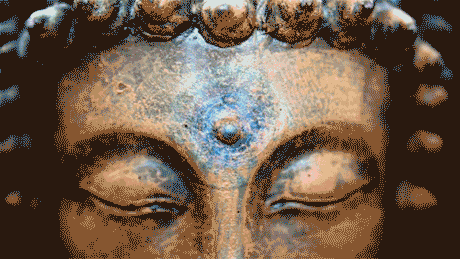
The practice of yoga is originated from India and rooted in both Hinduism, and Buddhism. To boil it all down to the basic beliefs of yoga and meditation is the awakening and discipline of the mind and body. The word “namaste” is spoke aloud at the end of every yoga session. It’s means “welcome”, referring to the reawakening and re-consciousness of one self. I know this because I’ve tried yoga in the past and learned what “namaste” meant. All other knowledge of these religious practices comes from further personal research and prayer. So at its core, meditation and yoga is to aid one to achieve control over themselves based solely on their own will. This “spiritual” philosophy totally goes against the Christian faith.
We as Christians, have chosen to give up the illusion of control to God because we were never in control of our own lives or anyone else’s in the first place. Only God our Creator is in control. Believing we can live this life on earth without Jesus, without God, leads to a meaningless and empty end. “Everything is meaningless,” says the Teacher, “completely meaningless!” What do people get for all their hard work under the sun?” (Ecclesiastes 1:2-3 NLT)
A reminder, this post is only addressed to my fellow believers in Jesus Christ. Those who’ve accepted Him as their Savior and Redeemer because we’ve accepted the truth of our sinful natures. It is through Christ that we are healed and whole. With all that said, we must be alert and sober to what practices we allow or invite into the Body of Christ. Modern variations of ancient religious practices do not cancel out their true intent. Like for example, renaming the yoga practice; “christian yoga”, and its many poses to better fit this current time or modern ideals. There’s been already so much compromise to our faith throughout the centuries as it is. We must take ownership and responsibility so no other believer may stumble in their walk with Jesus. Modern New Age thinking meditation and yoga has already penetrated our church walls, chose to be a vigilante watchmen on the wall. (Isaiah 62:6-9) In Jesus Name!
#yoga#christians#christian yoga#meditation#hinduism#buddhism#ancient practices#ancient history#christianity#new age#new age practices#modern day#modern philosophy#walking with god#walking with Jesus#the body of christ#the church#church#compromise#responsibility#ownership#watchmen on the wall#watchmen#being a Christian#being human#mistakes#struggle#look to Jesus#pray#red flag symbols for christians
1 note
·
View note
Text
Bruno Buccellati - Monster AU Profile

Bruno Buccellati, something much greater than a human, with more power than you could imagine.

Preface about species type:
In this AU, Bruno is an angel—a Catholic-aligned, Biblical angel to be specific—of the highest order, having inspirations and traits from depictions of both Seraphim and Thrones. The intricacies of Religion in the Monster AU are hard to get into, but as a general idea, understand that most major theistic religions (Judaism, Islam, Christianity, Hinduism, Shinto, as well as many native religions and other theology e.g. Greek, Norse, Finnish) all 'coexist' to an extent, in terms of actual mythological legitimacy. I'm not going to get into all of it, just know that Buccellati being a Catholic-aligned angel doesn't mean there aren't also, say, Jewish-aligned angels. It's complicated. Being a thematic combination of a Seraph and Throne, Bruno's true form is largely incomprehensible to the average human, and he has incredible, yet limited, divine power. He's "from" "Heaven", but unlike what one might expect, he's not much limited by a 'divine law'; he has no strict morals that he must adhere to, and perhaps he doesn't necessarily have a directive on Earth. The circumstances for his existence as he is here are a little complicated, but, simply put; in a sense, he's just here to keep an eye... or several... on things.
Details related to Angelicism:
Forgive me but— he's basically the Aziraphale to Abbacchio's Crowley.
Trying to 'save' or 'redeem' him. He knows there's still good left in him. The, uh, getting him to join the mafia thing is... questionable, but we're not gonna get into all that.
Both Buccellati and Abbacchio recognised what each other was the moment they set eyes on each other. Their energies and auras were clear and visible to each other. Abbacchio naturally turned to retreat initially, but Buccellati recognised the good he saw remaining in Abbacchio and instead of letting him leave, offered redemption. And maybe some part of Abbacchio knew there was good left in him, because he accepted.
He uses his human form most of the time as it doesn't make much sense for him to use his true form when most can't properly comprehend it and it would really just freak people out.
He also has a '''true voice''' to go with the true form. It can't really be effectively described as it's, like his true form, fairly hard to comprehend, but if words had to be put to give a general idea; imagine a voice that is actually a collection of several different simultaneous voices, heavily distorted, completely understandable communicatively despite being so hard to process.
When enraged or when he generally just loses his cool, sometimes the true form will slip through, which often occurs with both visual and vocal distortion, but may also only appear as vocal distortion.
The true voice and form are both pretty terrifying no matter who's experiencing it, especially as he's a high-order angel, thus incredibly powerful.
Sometimes uses a bit of the True Voice intentionally to intimidate people. Most people around who have caught snippets of it generally end up writing it off as "that's just Bruno being Bruno", which, to be fair, it is,
He has an... Aura. I'm not talking about the Stand Aura; he at times appears to have a sort of golden glow around him, particularly around or behind his head. You can actually see it, at least, and the longer you look, the clearer it gets, it's just hard to pinpoint what exactly you're looking at.
If you catch sight of him just out of the corner of your eye, his true form will be perceived instead. But because it's hard to comprehend, it essentially means he can't really be seen at the edge of someone's peripheral (unless the person in question happens to have some kind of special eyesight) and it ends up looking a bit like catching a movement or shadow out of the corner of your eye.
He's an angel, yes, a divine being, not a human. However... he still had his parents. How does that work? Well, sometimes circumstances like this can occur. Sometimes, a baby may fall deathly ill. The parents, helpless to improve the situation by their own abilities, turn to praying for a miracle. The baby isn't given much time left to live, then suddenly, miraculously, recovers, as if they had never been ill in the first place. The child's soul may have been substituted with an angel as the original soul had to move on. The child will be raised as a human, and will watch over their human parents once they have the cognisance to recognise their own true nature; somewhat reminiscent of a less-sinister changeling. This may be the case with Bruno.
Perhaps one of the many reasons he is so opposed to drugs in the way that he is; he was sent to trade places with a human and to protect the human that would raise him, but his human father's death was ultimately caused by drug dealers, and Bruno was thereby unable to protect him in that situation, interfering with his purpose for being on Earth.
Again, yes, he's an angel. But this doesn't mean he must be perfectly virtuous and nonviolent. He unsurprisingly frequently uses violence as a means to an end. While violence isn't typically his first answer to most problems, he will never hesitate when he feels that it IS the answer.
Details about Buccellati:
Generous and welcoming to those in need. Very nurturing and protective by personality. You Do Not Mess With His Men.
Particularly protective of his human men. Humans are so... fragile. Plus, Fugo joined him first, that's his firstborn-
Loves to play up the whole 'angel' thing when he gets the chance. Likes to use the sort of "Old English" equivalent of Italian (so, Latin, I suppose). 'Be not afraid, child...' ...Fugo gets on his case for grammatical errors frequently.
Has an instinct to know when his children men have broken something (generally an object). This generally allows him to show up near-immediately after something's been broken to lecture whoever broke it about being more careful. In some extreme circumstances, it can be used to call on him for backup—preferably, just try not to have the thing you're breaking be your bones.
Being a literal divine being doesn't save him from being a Suburban Parent stereotype. Stupidest dad jokes you've ever heard that are so unfunny that they're ironically funny, and the irony eventually gets lost and they're just ... funny. Live laugh love! Man I Love Fishing! Turn that frown upside down—
It's really hard to sneak things by him. Even when he turns his back, he seems to know if you're doing something you shouldn't be. He jokes that he has eyes in the back of his head... but is he really joking?
Very kind when he can afford to be. Civilians love him! He always finds it so funny when people are like "Thank God you're here!!" or "You're a godsend/blessing!" because he's like... 😏 that's right
Hates drugs! Winners don't do drugs! This hasn't changed.
Oh dear! It appears that this daughter, which is not mine, is a demon! I can fix one of those problems by becoming her new father.
Yes there's Bruabba but it's really more queerplatonic than anything as Buccellati doesn't feel a full grasp of romantic 'love' and Abbacchio isn't ready for romantic love after suffering the kinds of loss he's suffered, so their relationship is blatantly not-platonic but doesn't reach fully into 'romantic'.
He's trying so so hard to control these kids but every day it's just another thing where Fugo's having a mental breakdown and Narancia's eating the asbestos in the wall insulation and Mista is getting way too close to Abbacchio with that silver cross necklaceWHO LEFT THE OVEN ON
#golden wind#il vento d'oro#vento aureo#jjba#jjba fanart#monster au#jojos bizarre adventure#jojo no kimyou na bouken#jojo's bizarre adventure#jojo monster au#jjba monster au#jojo au#jjba au#bruno bucciarati#bruno buccellati#team buccellati#team bucciarati#bucci gang#monster au profile#character profile#bruabba#amby draws#my art
50 notes
·
View notes
Text
youtube
New Video: 12 Khalifa aur 12 Avatar | Sufi Master Younus AlGohar | ALRA TV https://www.youtube.com/watch?v=SW1C4DerdVw
As per the Tradition of Prophet Muhammad (s), Muslims believe there will be 12 Caliphs in Islam while Hindus believe in the 12 Avatars. According to the Muslim tenet, the 12th Caliph shall be the Awaited Mehdi whereas Hindus believe the 12th Avatar shall be the guise of Shankar Bhagwan (aka Adam Safi Allah, the founder of Hinduism) who yields the collective powers of Vishnu Maharaj, Brahma and Krishna and shall be the Kalki Avatar.
Sufi Master Younus AlGohar eliminates animosity between the two religions by elucidating that adherents of both Islam and Hinduism anticipate the coming of the same individual, as God shall send a Redeemer who shall be known by various appellations in different religions.
✅ Get the latest updates from ALRA TV on Telegram Messenger. Download Telegram Messenger from the AppStore or Google PlayStore and subscribe to: https://t.me/official_alratv
❓ Question Sufi Master Younus AlGohar directly! Text your questions to us on WhatsApp: +447472540642 or Facebook messenger: http://m.me/alratv
Watch the live recordings of these lectures every day at 22:00 GMT at: http://www.younusalgohar.com
For Izn e Zikr-e-Qalb (Permission for Awakening of the Spiritual Heart) call Shaykh Amjad Gohar on this number +44 (0) 740 1855 568 via WhatsApp.
📱Social Media Instagram: http://instagram.com/alratv https://www.instagram.com/younus_algohar
Twitter: https://twitter.com/AlRa_TV https://twitter.com/mehdifoundation https://twitter.com/MessiahFdn https://twitter.com/younusalgohar
Facebook: https://www.facebook.com/alratv/ https://www.facebook.com/HHYounusAlGo…
Websites: http://www.goharshahi.us/ http://www.theawaitedone.com/ http://thereligionofgod.com http://www.younusalgohar.org/
NEW URDU LANGUAGE WEBSITE http://www.mehdifoundation.com/
#Imam Mehdi#Gohar Shahi#Younus AlGohar#Sufism#Kalki Avatar#Khalifa#Motivation#Enlighten Heart#Spirituality#Divine Love#Inner Peace#Sufi Master#Youtube
0 notes
Text
Channeled Angelic Wisdom of the Jewels of Truth Series on Justice & Apostasy
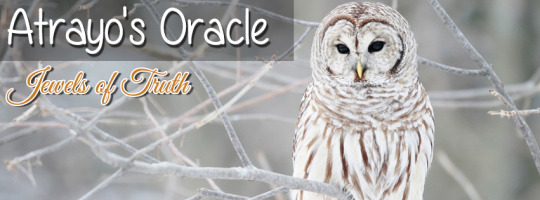
Hello All,
Here at the tail end of this month of May 2023, I'm posting two channeled angelic heavenly statements via psychic Inspirational clairaudient automatic writing. The first one on Justice is slightly heavy-duty as a topic. However, certainly, the 2nd topic of Apostasy is controversial, to say the least. The angel here shares the blame with Judaism, Christendom, and the unholy feud between Islam and Hinduism stating God's disappointment at the whole ordeal.
Doing this as my spiritual devotional outlet at times very therapeutic on a psychic Intuitive basis. It has transformed me for the better the content although at times intense can also be flowery as poetic and philosophical in holy nature. I often consider myself as a young sage and mystic, perhaps even an amateur theologian with this 27+ year ongoing angelic heavenly host discourse. With over 4500+ topic statements on a litany of eclectic subject matter from the mundane well into the extraordinary in a universal divinity.

If this is your very first reading of my Intuitive angelic materials then you've jumped into the deep side of the swimming pool. I would rather recommend as a shameless plug to please consider my 3 volumes of the "Jewels of Truth" series of paperback books published by iUniverse. (ie also in Amazon Kindle, Ebook, & Barnes & Nobles Nook formats)
Without a further adieu may you be at least intrigued by expanding your beautiful spiritual horizons whether you accept the premise or not of these topic statements. Amen.
Justice:
3232) Towards each of your merits whether those of the unforgiven will suffer immeasurable discord being unable to alleviate such pain in their solemn lives. Their wants will turn to ash before their very eyes. For yearning for the very objects and people as riches and powerful status they can ill afford to gain presently.
Here is where fools come to tread only to achieve their ill-gotten spoils instead. This is so because of their prior stances with miserable unethical conquests they have sunk into personally. Such an ill-advised journey forestalls the good by traveling the byways of ruin within the shadows of this chaotic world.
The best punishment from an all-knowing Supreme God Almighty is to give them all they have desired with the weight breaking nearly their hearts, minds, and shoulders in life. To pursue the riches and the status of this world without merit and mercy as living compassion for each other. Then suffer the consequences to avail yourselves a trajectory that is best not to tempt the fates.
The status and riches of this world aren't evil just how they are obtained as destructive in personal nature versus creative and mutually constructive is far better. To have greed and lust for wealth and other people feeds your minds and hearts poisonous ruin with contempt. Regardless of this is a man, woman, and even a child yearning with flights of fancy as a person of rotten character.
No matter if shrewd wisdom as machinations by criminals and fallen political leaders as proverbial charismatic False Prophets deceive the masses. As the dictum says that the path to Hell is paved with good intentions.
However, in a very paradoxical universe we each find ourselves deeply within currently. The path of the Heavens can be equally paved with conditional unwittingly selfish intentions in a hap-hazard capacity. Many a hero or heroine have started with petty intentions only to be transformed personally on their life's journey to be redeemed by God and the Heavenly Host.
Both Heaven on Earth and Hell on Earth rule simultaneously here upon this physical and metaphysical universe you call Creation. These realms of the afterlife are subsequently Perpetual States of Being and not spatial locations of the hereafter or of Infinity. Thus the Great Mystery of God(dess) persists for the penitent heart to resolve hopefully within a lifetime or many reincarnated lifetimes.
When Justice is perverted by dangerous miscreants of the State as your political leaders and/or civil public servants. Their ultimate glory as reigning fame becomes the ruin of the victims impacted be they innocent and guilty alike in question.
Although when Justice is indeed virtuous in a noble well thought fashion it redeems and forgives all with Mercy. Even for the once fallen from grace by ill-repute. This becomes a consecrated act of holiness for the earth and the lesser heavenly limbo where personal sacrifice is rewarded with prosperous dignity and redemptive peace.
This is how to ascend within a lifetime back to God by faithful praises and to put aside the discordant chaos this world exudes relentlessly. Please choose to become beautiful and handsome angelic-like spirits within the eternal "Now" and this Infinite "Here" of the Kingdom/Queendom of God(dess) everlasting. Allow forgiveness to become a staple of personal Inner strength and each of you will witness the redemptive Glory of God before your very eyes and hearts forever. Amen. ---Ivan Pozo-Illas / Atrayo.

Apostasy:
3233) The ways of a wanton world obfuscate the truth in order to subjugate the old with the new using blatant falsehoods as sheer propaganda in question. All major religious traditions often led by Great Patriarchal movements tend to whitewash their misdeeds by subverting the truth and projecting falsehoods in their place.
For instance, Christendom has victimized the elder indigenous faiths of paganism of the Old and New World altogether for centuries. When the grandmotherly Slavic matriarchal spirit of pagan Old Eastern Europe of Baba Yaga encountered Christiandom she was soon demonized as a child cannibal predator. All in an effort to steer worshippers into the Imperial Churches of Rome and Byzantine.
Another example of Christendom is when the Ancient Roman Empire converted to Christianity away from Hellenism. The Ancient Greek Creator lesser deity of Lucifer was soon falsely associated with the Infamous Satan the Devil. Again to uncouple their populace by literally demonizing the old religious ways for eons for the new Christian Church of Emperor Constantine.
The sins of great religions must have accountability before Almighty God with divine transparency for all the faithful concerned. Your modern age notwithstanding truthful non fear-mongering democratic ideals that no one is above the law. This shall include man-made religious traditions bearing false witness for centuries and eons to date.
This includes the Great and Holy Lands of Judea when the Pantheon of the now foregone Ancient Semitic Canaanites prevailed. Where the children of Abraham knew of the old ways where the Wife of God was known as Asherah and Shekinah was the feminine face of God. Here in the Lands of Canaan, the Jews worshipped the chief lesser Creator deity of "EL" before they migrated into monotheism.
Thereafter the deified son of EL otherwise known as Bhaal the fertility god of Life and the Storm god of rain and dew and also Lord of Heaven by the Phoenicians of Bhaal Shamen in such a polytheist society. Was demonized by the Jews as a Devil in order to scapegoat on the altars of discord to decouple from such a once proud religious tradition.
This is not to mention the sacrilegious tendencies to falsely accuse the Jews by the upstart Christians. To persecute the Jews falsely for centuries within Old Europe and now the modern world. For even Holy Christos was a young Rabbi in his day and his religious movement was meant as a sect of Judaism. Such an inter-religious sibling rivalry of covenants is malaligned before the Eyes of God Almighty.
To further declare profusely that the children of Islam of the Great Prophet Mohammed Eternal Peace is Upon Him Forever ordained by God himself! Have clashed upon the Indus Valley vehemently with the noble Hindu of Lords Brahma, Vishnu, and Shiva. Fierce mutual hatred in certain circles has led unto Hell on Earth as a falsified state of hellish being for such proud peoples and worshipers of God.
This power struggle within Mother India for cultural supremacy leaves no one as a direct winner. Only losers will inherit woe, destruction, and bitter rivalries to no end in sight. Such is the way of the apes and not the holy children of God irrespective of religious tradition upon the world. Please heal this god-awful curse of a religious blood feud seeking to cultivate Heaven on Earth together culturally, spiritually, and humanely by the Divine Will of God.
To victimize innocent older spiritual and/or religious traditions for the gain of the newer spiritual and/or religious faiths upon the world. Is a mighty disservice to all worshippers of the holy divines and an act of sheer destructive Apostasy that has no place upon the noble-hearted. Such an Orginal Sin to borrow a tenant of the Roman Catholics is of no good to certainly modern well-educated societies the world over.
Penance and mutual healing through forgiveness and accurate inclusive spiritual education where the slander and libel truly happened by overzealous religious leaders must occur. Otherwise, the sins of the man-made Patriarchal Temples, Churches, Mosques, and Holy Shrines will persist well into the afterlife for the ancestral dead to bear witness before God in Judgement. Amen. ---Ivan Pozo-Illas / Atrayo.
Ivan "Atrayo" Pozo-Illas, has devoted 27 plus years of his life to the pursuit of clairaudient Inspired automatic writing channeling the Angelic Heavenly host. Ivan is the author of the spiritual wisdom series "Jewels of Truth" consisting of 3 volumes published to date. He also channels conceptual designs that are multi-faceted for the next society to come that are solutions based as a form of dharmic service. Numerous examples of his work are available at "Atrayo's Oracle" blog site of 17 years plus online. You're welcome to visit his website "Jewelsoftruth.us" for further information or to contact Atrayo directly.
#JewelsofTruth #AtrayosOracle #ivanpozoillas #automaticwriting #God #angels #psychic #theology #spiritguides #justice #apostasy #christianity #judaism #islam #hinduism #spiritualwisdom #metaphysics #Mysticism
0 notes
Text
Sadhna TV Satsang 07-05-2024 || Episode: 2921|| Sant Rampal Ji Maharaj L...
#GodMorningWednesday #WednesdayMotivation #WednesdayThoughts
#अविनाशी_परमात्मा_कबीर
Sant Rampal Ji Maharaj
#जगत_उद्धारक_संत_रामपालजी
#TatvadarshiSant
#TrueGuru
#SantRampalJiMaharaj
#FactfulDebates
Sant Rampal Ji Maharaj
YouTube Channel
#ऐसे_सुख_देता_है_भगवान
👑Kabir Is God👑
#KabirIsGod
#SaintRampalJi #SaviourOfTheWorld
#SocialReformer
#trending #fbreels #saviour #equality #spiritualjourney #SatlokAshram #redeemer #liberty #inspiration #lifequotes #freedomfighter #Satlok
#india #world #Faridabad #Haryana
#gurugranthsahibji #waheguru #shiva #scriptures
#god #krishna #harekrishna #mahadev #hinduism #bhagavadgita
#omsai #bible #balaji #almighty #incredibleindia #suvichar #jesus #allah #quran #kedarnath
#Kabir #trending #viralreels #viralreelsfb #trendingreels #viralvideo
#reelsinstagram #reelsindia
#SupremeGod
*परमेश्वर कबीर साहेब जी*
*सर्व शक्तिमान, पापनाशक, परम अक्षर ब्रह्म कबीर साहेब जी ही हैं।*
*वेदों में प्रमाण हैं* ! _*कबीर देव भगवान है
1💠श्रीमद्भगवद गीता अध्याय 8 का श्लोक 3 में
गीता ज्ञान दाता ब्रह्म भगवान ने कहा है कि वह परम अक्षर ‘ब्रह्म‘ है जो जीवात्मा के साथ सदा रहने वाला है।
वह परम अक्षर ब्रह्म गीता ज्ञान दाता से अन्य है, वह कबीर परमात्मा हैं।
2💠परमात्मा शिशु रूप में प्रकट होकर लीला करता है। तब उनकी परवरिश कंवारी गायों के दूध से होती है।
ऋग्वेद मंडल 9 सूक्त 1 मंत्र 9
यह लीला कबीर परमेश्वर ही आकर करते हैं।
0 notes
Text
apr 24
a rose by any other name
"because of the fragrance of your good ointments, Your name is ointment poured forth." song of sol 1:3
perhaps many of you will think i am straying too far from scriptual importance, but i think not. you see, the whole message of the bible is just really one big, long love letter from a Creator to His creation; from our God to us. in His imagination we are not just another of His creation brought forth for His amusements. we were created in His very own image; created to be like Him and oh, what a mess we have made of it.
be that as it may, His love and desire for us exceeds any limits we knew love could reach; that the creator would don our limitations, endure our temptations, feel our anxieties and enter the realm we most greatly feared - the unknown realm of death. He would do all this without experiencing the shortcomings and failures we had succumbed to. He would redeem His beloved creation from the vast canyon our actions had dug. so it was in shakespeare's romeo and juliet - two families divided in such a way that only the tragedy of unfulfilled love could unite them again.
i love roses. i have more than a dozen rose bushes in my front yard alone, each sharing their unique beauty and vibrant colors. their fragrance and their prickling thorns remind of the pain such beauty sometimes requires. i think of my Lord whose brow was pierced with harsher thorns and the sweetest of fragrances that emerged with His blood; blood that allows one to jump in and swim across the canyon of sin created by our depravity.
i know i might be getting too "flowery" here with my words, but even in my extremity i cannot come close to the love God has for His creation; His prized creation. i don't always put a lot of stock in near death experiences because i will not allow my faith to stand on someone else's experiences. it's just that i remember one man's story about having died and experienced the hereafter. he remarked how he had angels almost approaching him with reverence. when he questioned why, he was told this, "because we see in you the glory of our Lord."
we know and must always be careful to remember all glory belongs to our God alone. He has said He would not share it. "I am the Lord, that is My name; and My glory I will not give to another." isa 42:8 but we are blood-bought and by His amazing grace we are allowed to be inheritors with His son, Jesus Christ. "by which have been given to us exceedingly great and precious promises, that through these you may be partakers of the divine nature, having escaped the corruption that is in the world through lust." 2 pet 1:4 we are reborn to grow "to a perfect man, to the measure of the stature of the fullness of Christ." eph 4:13 all this so He might be the firstborn among many brethren.
now just try to tell me that isn't a love story than exceeds time and space itself; exceeds all of creation and the yet uncreated. "in this is love, not that we loved God, but that He loved us and sent His Son to be the propitiation for our sins." 1 john 4:10
"do not fear, little flock, for it is your Father’s good pleasure to give you the kingdom." luke 12:32 all the time we thought we had an fervent love for the Lord. His love for us exceeds anything we could ever know or imagine.
as so, whether we're left with romeo and juliet or we're left with the shulamite girl pursuing her beloved until He embraces her in exquisite passion, we're left with the question: would a rose by any other name smell as sweet? the fact is: "there is no other name under heaven given among men by which we must be saved.” acts 4:12
it's only in the knowing of what we are looking for that enables one to fill that vacuum inside; and it's not a "what" - it's a "who." if one is seeking to fill that emptiness with any religion, including the "big five" religions, they are looking in the wrong place. those most notable would be: hinduism, buddhism, judaism, christianity, and islam. i would suggest He is not found in any of these. He is found in a name, in a relationship, in a torrid love affair. He is found in Jesus. and no - no other name could smell as sweet.
0 notes
Text
Exploring the Concept of Sin in Different Religions
youtube
Sin is a concept that has been present in many religions throughout history. Although it may have different meanings and interpretations, the concept of sin often refers to an immoral or wrongful act that goes against a religious or moral code. But how do different religions approach this idea? Let's dive in and find out.
In Christianity, sin is seen as a transgression against God's will, which results in a separation from Him. Christians believe that sin entered the world when Adam and Eve disobeyed God in the Garden of Eden, and since then, all humans are born with a sinful nature. The only way to be redeemed from sin is through faith in Jesus Christ, who died on the cross to pay the price for humanity's sins.
In Judaism, sin is viewed as a violation of God's commandments, but it is not seen as something that inherently separates humans from God. Instead, Jews believe that repentance and good deeds can lead to forgiveness and atonement for one's sins. The concept of sin is also tied to the idea of free will, and the belief that humans have the ability to choose between right and wrong.
In Islam, sin is seen as a deviation from the path of God, which can result in punishment in the afterlife. Muslims believe that humans are born sinless, but can become tainted by sin through their own actions. The concept of sin is closely tied to the Five Pillars of Islam, which include acts such as prayer, fasting, and giving to charity. Muslims believe that by performing these acts, they can seek forgiveness for their sins and draw closer to God.
In Hinduism, sin is seen as a hindrance to spiritual progress and can result in negative consequences in this life or the next. Hindus believe that karma, the law of cause and effect, plays a significant role in determining one's fate. Actions that are deemed sinful can lead to negative karma, which can result in suffering or rebirth in a lower form of existence. The goal of Hinduism is to achieve liberation from the cycle of rebirth and attain union with the divine.
In Buddhism, sin is viewed as a form of ignorance or delusion that leads to suffering. Buddhists believe that all beings are subject to the law of karma, and that actions performed with good intentions lead to positive outcomes, while actions performed with harmful intentions lead to negative outcomes. The concept of sin is closely tied to the Four Noble Truths, which state that suffering exists, suffering arises from craving and attachment, suffering can be overcome, and the path to the end of suffering is the Eightfold Path.
In conclusion, while the concept of sin may differ among different religions, it is clear that it plays a significant role in shaping beliefs and practices. Whether viewed as a transgression against God, a violation of moral codes, or a hindrance to spiritual progress, the idea of sin reminds us of our human fallibility and the need for humility, repentance, and spiritual growth.
religion #sin #Christianity #Judaism #Islam #Hinduism #Buddhism #spirituality #faith
0 notes